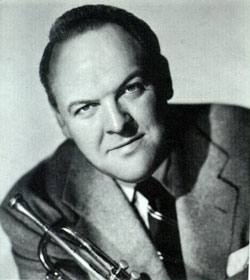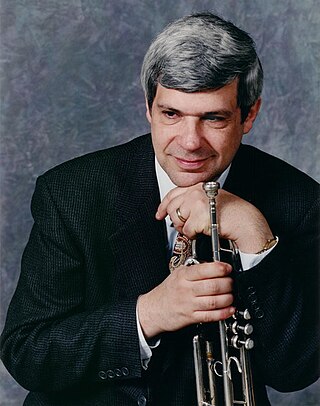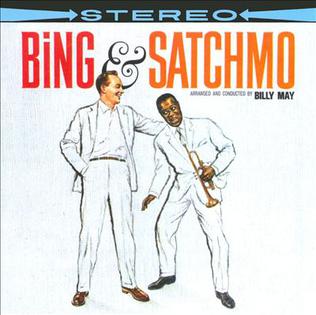
Edward William May Jr. was an American composer, arranger and trumpeter. He composed film and television music for The Green Hornet (1966), The Mod Squad (1968), Batman, and Naked City (1960). He collaborated on films such as Pennies from Heaven (1981), and orchestrated Cocoon, and Cocoon: The Return, among others.

George Abel Van Eps was an American swing and mainstream jazz guitarist.

Bing Sings Whilst Bregman Swings was Bing Crosby's sixth LP, his first album for Verve, recorded and released in a mono format in 1956.

New Tricks was Bing Crosby's eighth long-playing album and sixth vinyl LP for Decca Records, originally released in 1957 as number DL-8575.

Jay Randall Sandke is a jazz trumpeter and guitarist.

"Chicago" is a popular song written by Fred Fisher and published in 1922. The original sheet music variously spelled the title "Todd'ling" or "Toddling." The song has been recorded by many artists, but the best-known versions are by Frank Sinatra, Ben Selvin and Judy Garland. The song alludes to the city's colorful past, feigning "... the surprise of my life / I saw a man dancing with his own wife", mentioning evangelist Billy Sunday as having not been able to "shut down" the city, and State Street where "they do things they don't do on Broadway".
"God Bless the Child" is a song written by Billie Holiday and Arthur Herzog Jr. in 1939. It was first recorded on May 9, 1941, by Billie Holiday and released by the Okeh Records in 1942.

"Crazy Rhythm" is a thirty-two-bar swing show tune written in 1928 by Irving Caesar with music by Joseph Meyer and Roger Wolfe Kahn for the Broadway musical Here's Howe.
Robert Alexander Scobey Jr. was an American jazz trumpet player of traditional or Dixieland music based originally in the San Francisco area and later in Chicago, Illinois. He was born in Tucumcari, New Mexico, and died in Montreal, Quebec, Canada.

Harry Barris was an American popular singer and songwriter. He was one of the earliest singers to use "scat singing" in recordings. Barris, one of Paul Whiteman's Rhythm Boys, along with Bing Crosby and Al Rinker, scatted on several songs, including "Mississippi Mud," which Barris wrote in 1927.

Julian Clifton "Matty" Matlock was an American Dixieland jazz clarinettist, saxophonist and arranger.

Nick Fatool was an American jazz drummer.
Mortimer Gerald Corb was an American jazz double-bassist.
"Sugar", also known as "That Sugar Baby o' Mine", is a popular song by Maceo Pinkard, his wife Edna Alexander and Sidney D. Mitchell. Recorded by Ethel Waters on February 20, 1926, it soon achieved chart success.

Bing & Satchmo is a 1960 studio album by Bing Crosby and Louis Armstrong that was arranged and conducted by Billy May. The album was recorded for Crosby's label, Project Records, and released by MGM.

After Bing Crosby's long-term Decca Records contract was up, he signed many short-term contracts with a wide variety of labels. These included many popular labels such as Reprise, RCA, Verve, Decca (again), United Artists, Capitol and more.

That’s What Life Is All About is a 1975 vinyl album recorded by Bing Crosby for United Artists at Chappells in London in February 1975. He was accompanied by Pete Moore and his Orchestra.

'Bing and the Dixieland Bands is a Decca Records album by Bing Crosby featuring songs with a Dixieland flavour which was issued as a 10” LP with catalog No. DL5323 and as a 4-disc 78rpm box set (A-852) and as a 4-disc 45rpm set (9–232).
Stanley Aubrey Wrightsman was an American jazz pianist.
"Old Folks" is a 1938 popular song and jazz standard composed by Willard Robison with lyrics by Dedette Lee Hill, the wife and occasional colleague of Billy Hill. The lyrics tell of an old man nicknamed "Old Folks" and reference his service in the American Civil War, his habit of smoking with a "yellow cob pipe", and the prospect of his death.














